The Best 10 Alternatives to Lacework (+ Pricing & Reviews)
Twingate Team
•
Jul 27, 2024

Lacework provides a unified security platform for cloud environments, offering services such as cloud security, code security, edge security, and Kubernetes security. While Lacework offers robust solutions, it might not be the choice for everyone. This article explores the benefits and considerations of using Lacework for your security needs.
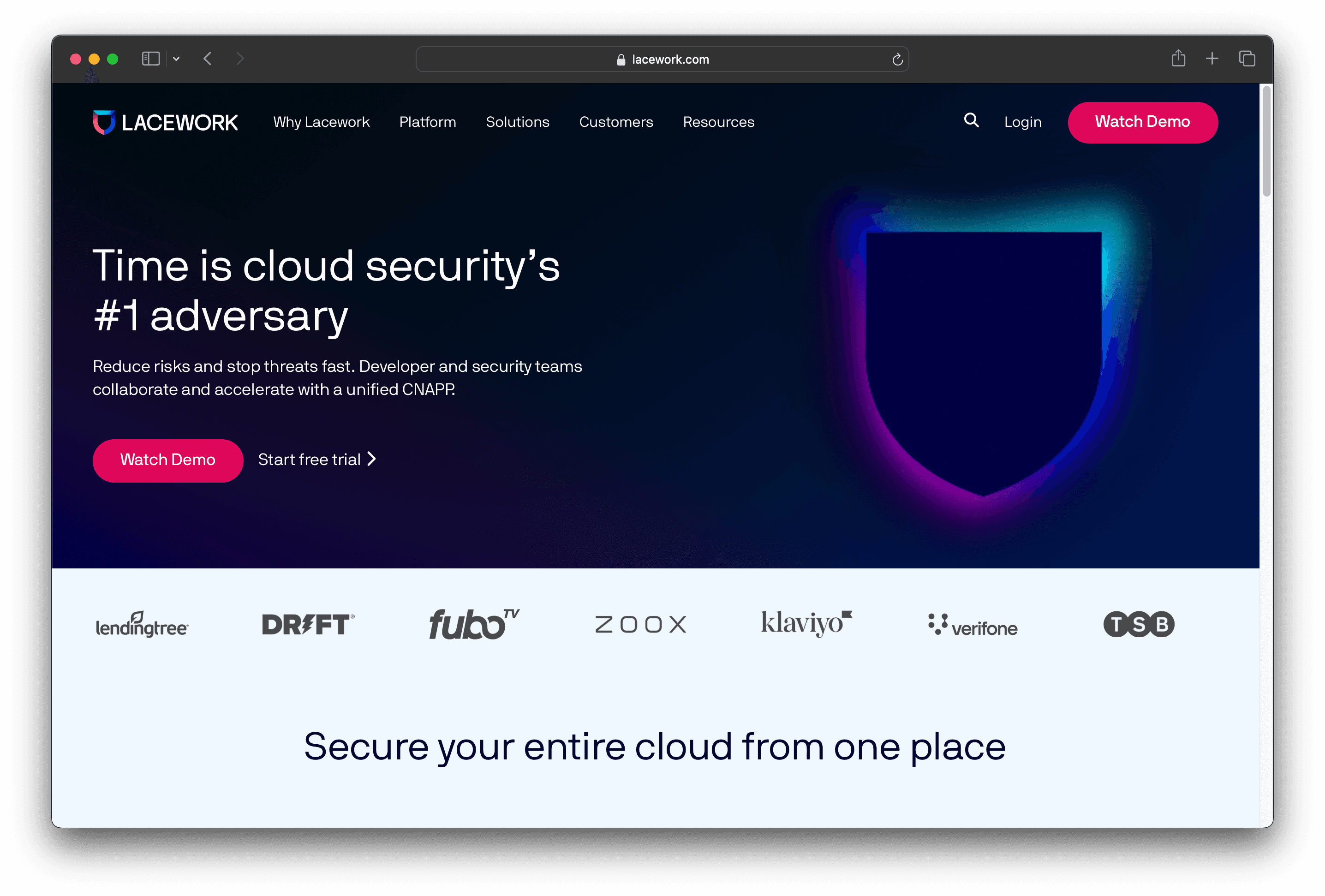
10 Alternatives to Lacework
1. Splunk
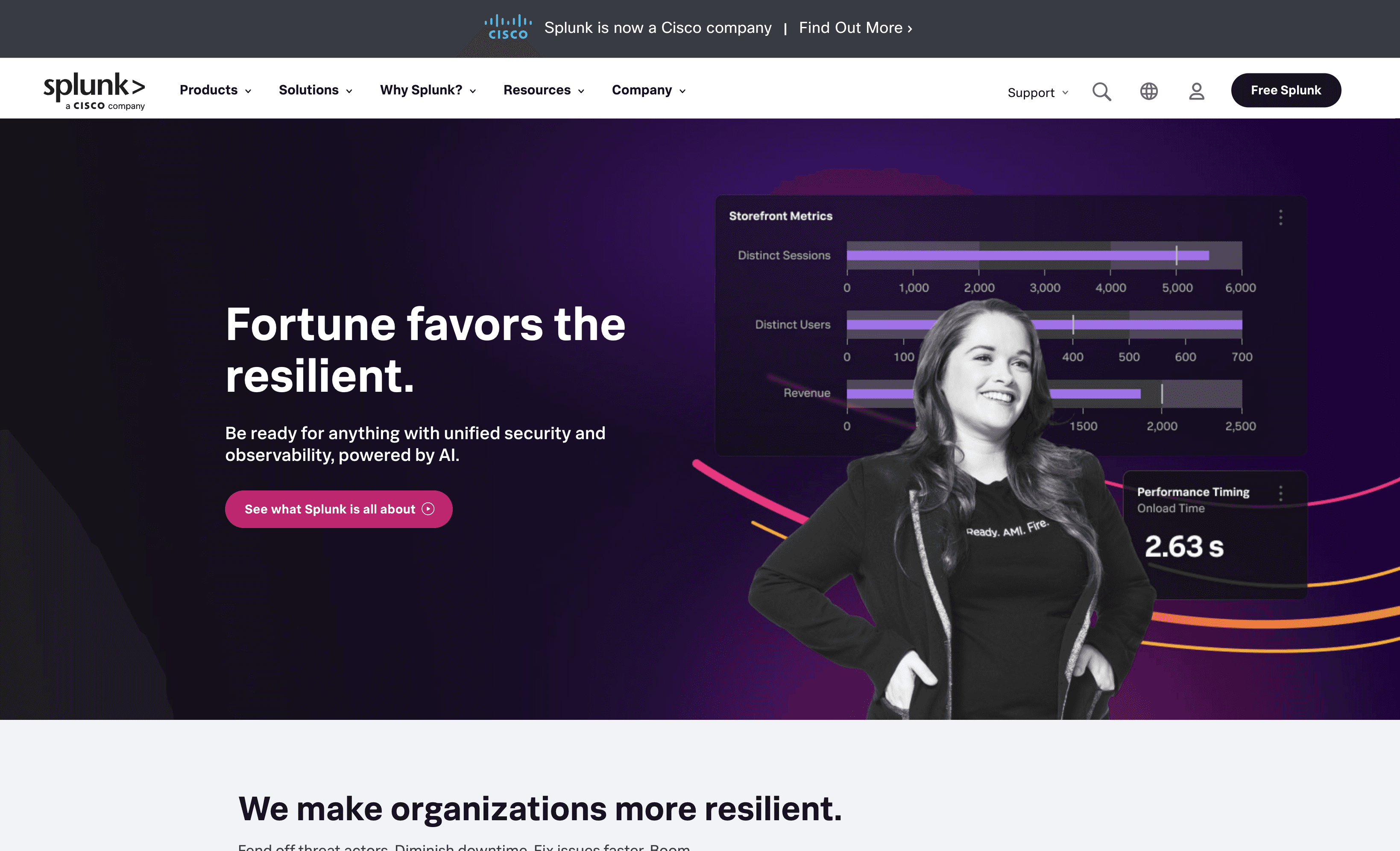
Splunk is a unified security and observability platform designed to enhance organizational resilience. Leveraging AI, it aims to fend off threats, reduce downtime, and expedite issue resolution. Splunk's solutions are tailored to accelerate detection, investigation, and response, making it a robust choice for businesses seeking comprehensive security and observability.
Splunk Pricing
Workload Pricing
Ingest Pricing
Entity Pricing
Activity-based Pricing
Splunk's pricing is not public. Contact their support for more info.
Splunk Reviews
Splunk has an overall rating of 4.3 out of 5 stars based on 36 reviews. Users praise its ease of use and robust security features. Check out more of our reviews here!
Pros and Cons of Splunk
Pros:
Splunk's AI-powered platform enhances security and observability, keeping humans in the loop for better decision-making.
Proven track record with leading organizations, improving threat response times and operational efficiency.
Unified platform provides comprehensive security and observability with shared data, context, and workflows.
Cons:
High cost associated with implementing and maintaining Splunk solutions, making it less accessible for smaller businesses.
Complexity requires specialized knowledge to fully leverage Splunk's capabilities, posing a learning curve.
Some users report limited features and missing functionalities, impacting overall user experience.
2. OPSWAT Security Score
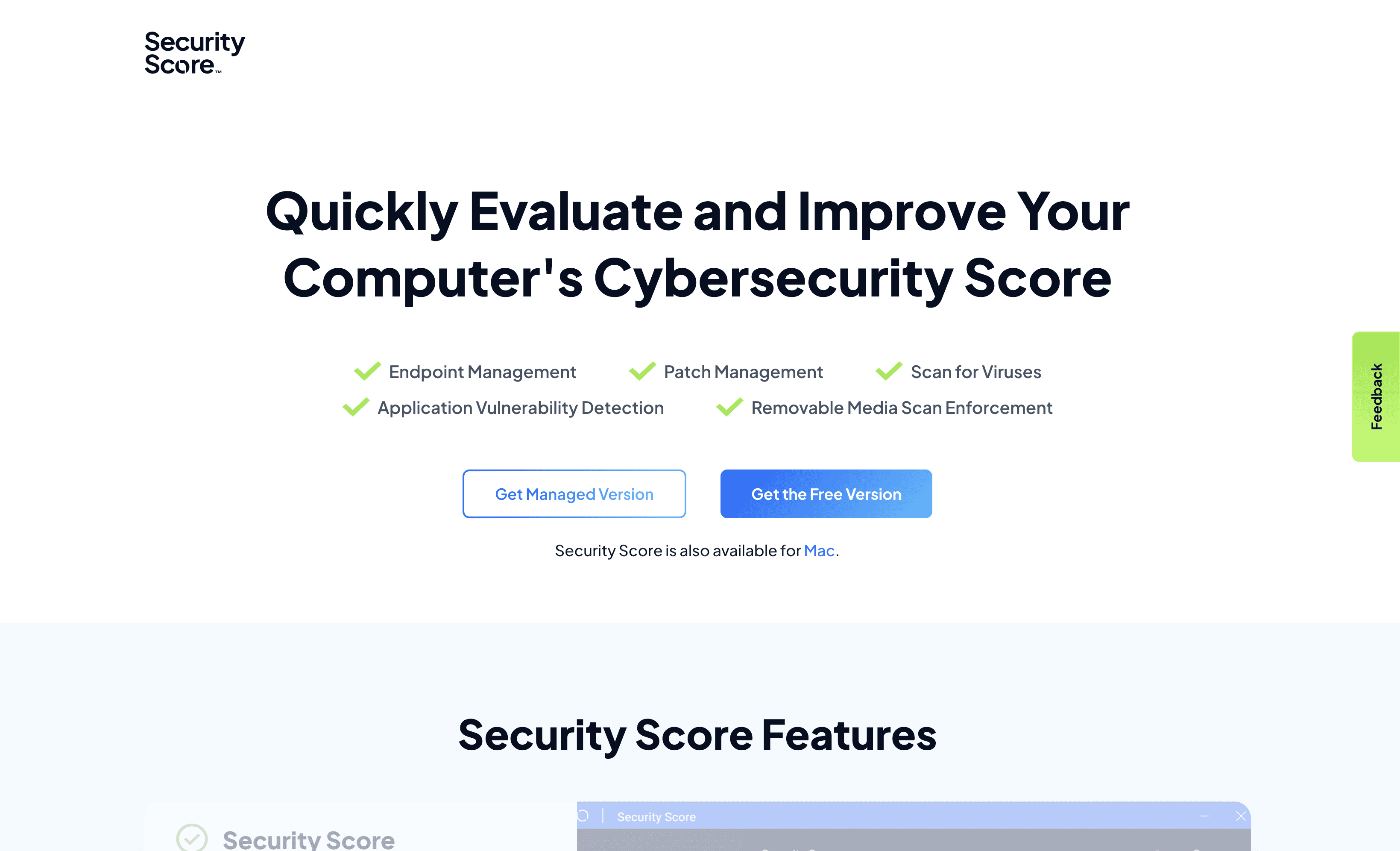
OPSWAT Security Score is a cybersecurity tool designed to evaluate and enhance your computer's security posture. It assesses risk factors, ensures software is up-to-date, and provides real-time antivirus scanning and firewall enforcement. With features like patch management and malware scanning, it aims to offer comprehensive protection with minimal user intervention.
OPSWAT Security Score Pricing
Managed Version
Free Version
OPSWAT Security Score's pricing is not public. Contact their support for more info.
OPSWAT Security Score Reviews
OPSWAT Security Score has an overall rating of 4.0 out of 5 stars based on 5 reviews. Users appreciate its comprehensive security assessment. Check out more of our reviews here!
Pros and Cons ofOPSWAT Security Score
Pros:
Comprehensive cyber-risk assessment based on multiple factors, ensuring robust protection.
Automatic patch management for third-party applications and OS updates, reducing vulnerabilities.
Advanced malware scanning technologies, including multi-engine AV and sandboxing, for thorough threat detection.
Cons:
Limited features unless the profile is claimed and upgraded by the vendor.
Lack of detailed security information from the seller, which may concern some users.
Insufficient number of reviews to provide comprehensive buying insights.
3. Prisma Cloud
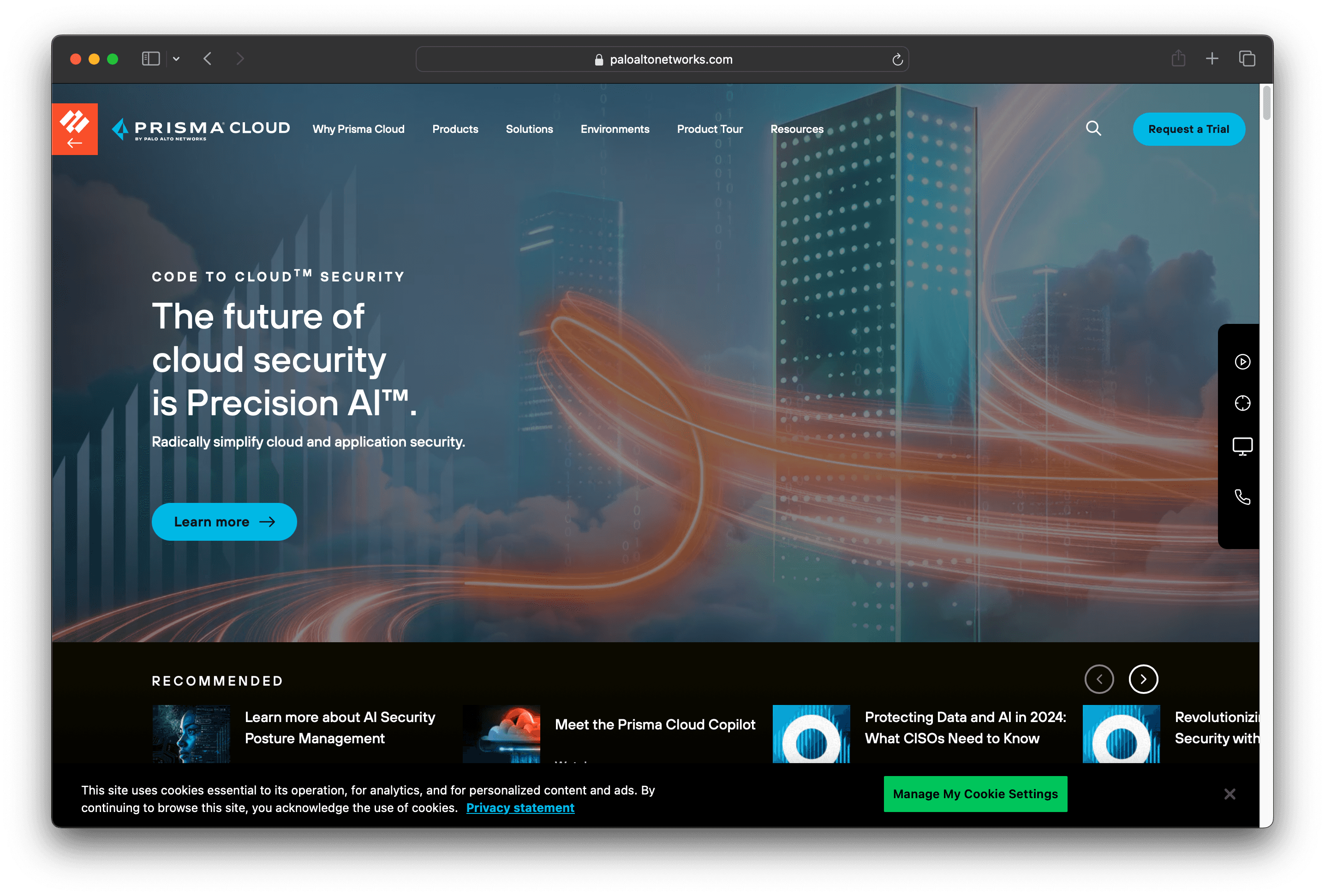
Prisma Cloud is a cloud security platform by Palo Alto Networks, designed to secure applications from code to cloud. It offers features like AI-powered risk insights, infrastructure protection, and real-time attack blocking, aiming to provide comprehensive security for modern cloud environments.
Prisma Cloud Pricing
Prisma Cloud's pricing is not public. Contact their support for more info.
Prisma Cloud Reviews
Prisma Cloud has an overall rating of 3.8 out of 5 stars based on 28 reviews. Users appreciate its comprehensive security features and ease of use. Check out more of our reviews here!
Pros and Cons of Prisma Cloud
Pros:
Comprehensive Security: Prisma Cloud secures every stage of the application lifecycle, from code to runtime, ensuring robust protection.
AI-Powered Risk Insights: Utilizes AI to rapidly prioritize risks and provide actionable insights, enhancing threat response.
Wide Range of Features: Includes code security, infrastructure protection, threat detection, and more, offering a holistic security solution.
Cons:
Complexity: The wide range of features and capabilities might be overwhelming for new users, requiring time to master.
Cost: Comprehensive security solutions can be expensive, which might be a consideration for smaller organizations.
Learning Curve: There might be a learning curve associated with fully utilizing all the features and capabilities of the platform.
4. Proofpoint
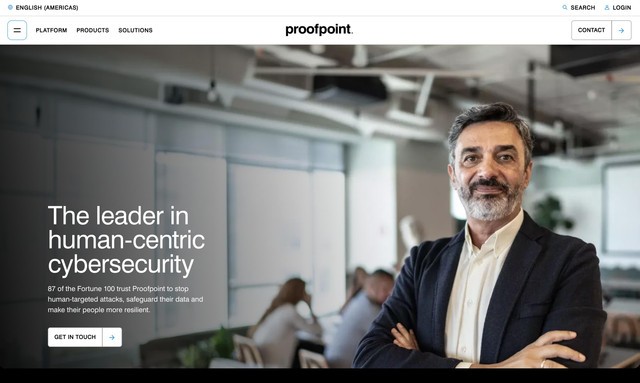
Proofpoint is a cybersecurity solution focused on protecting organizations from cyber threats. It offers a human-centric approach, emphasizing the protection of people and data. With features like email security, data loss prevention, and insider threat management, Proofpoint aims to provide comprehensive and adaptive protection for businesses.
Proofpoint Pricing
Proofpoint's pricing is not public. Contact their support for more info.
Proofpoint Reviews
Proofpoint has an overall rating of 4.6 out of 5 stars based on 498 reviews. Users appreciate its high detection rates and robust email filtering. Check out more of our reviews here!
Pros and Cons of Proofpoint
Pros:
Human-Centric Approach: Focuses on protecting individuals, crucial as most cyberattacks target people rather than just technology.
Comprehensive Solutions: Offers a wide range of products, including threat defense, information protection, and security awareness.
Industry Recognition: Trusted by 87 of the Fortune 100 companies and recognized as a leader by analyst firms.
Cons:
Complexity: The extensive range of products can be overwhelming for smaller organizations or those new to cybersecurity.
Cost: High-end, comprehensive solutions can be expensive, limiting accessibility for small to medium-sized businesses.
Integration Challenges: Implementing a multi-layered security platform may require significant integration efforts with existing systems.
5. ESET PROTECT Complete
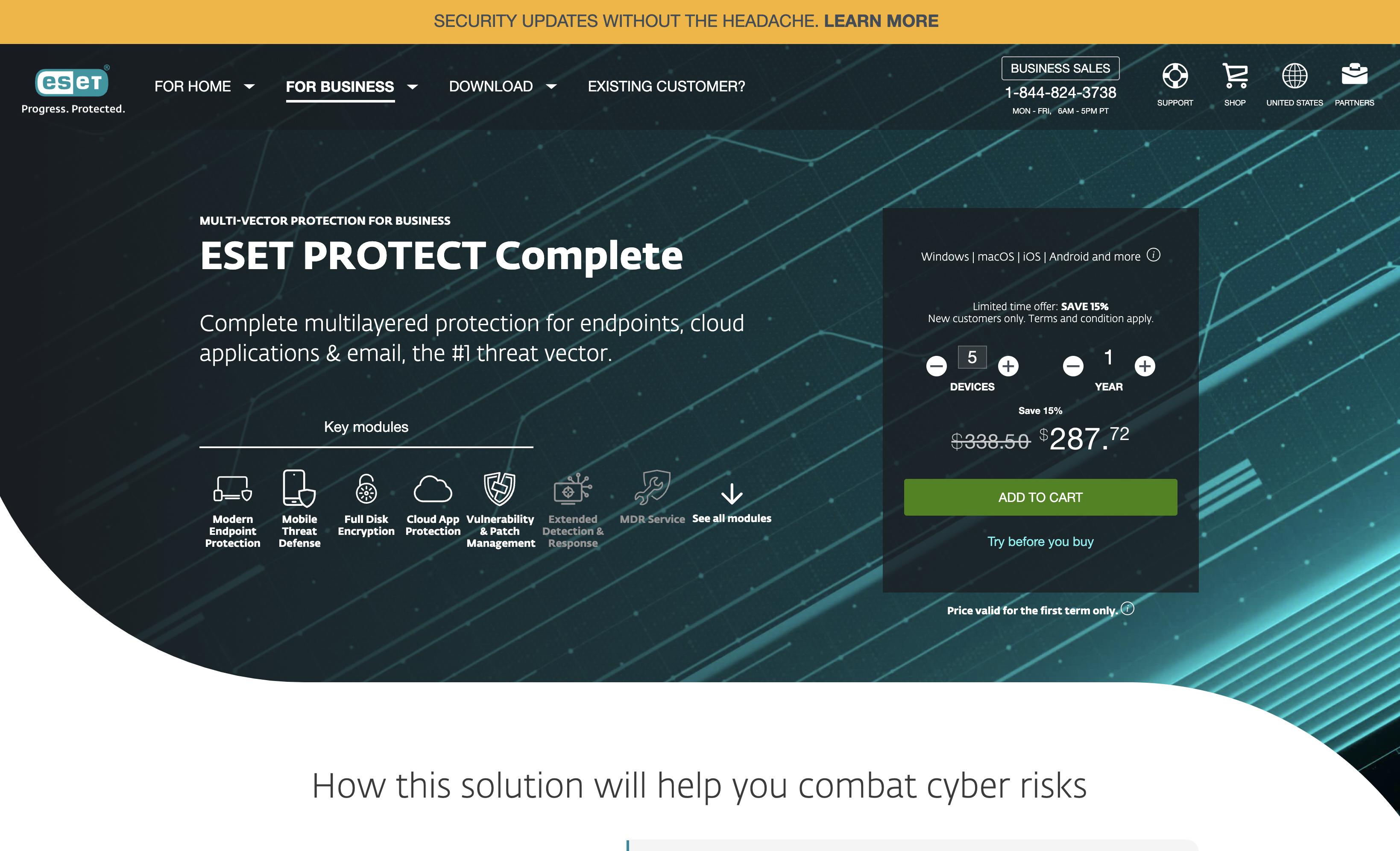
ESET PROTECT Complete is a comprehensive cybersecurity solution designed for businesses. It offers advanced endpoint protection, mobile threat defense, full disk encryption, and cloud app protection. With easy deployment and integration capabilities, it aims to provide robust security while ensuring seamless operation within existing infrastructure.
ESET PROTECT Complete Pricing
Original Price: $338.50
Discounted Price: $287.72 (15% off)
ESET PROTECT Complete Reviews
ESET PROTECT Complete has an overall rating of 4.5 out of 5 stars based on 50 reviews. Users appreciate its comprehensive security features and ease of use. Check out more of our reviews here!
Pros and Cons of ESET PROTECT Complete
Pros:
Advanced Protection: Offers robust security for Microsoft 365 and Google Workspace apps, including anti-malware and anti-phishing features.
One-Click Data Encryption: Simplifies data protection with easy-to-use, one-click encryption for sensitive business information.
Multilayered Technology: Provides comprehensive security across endpoints, mobile devices, and file servers, ensuring thorough protection.
Cons:
Price Validity: Promotional pricing is only valid for the first term, with potential price changes afterward.
Additional Modules: Some advanced features require upgrades to higher tiers, which may incur extra costs.
Complexity for Small Businesses: The extensive features might be overwhelming for smaller organizations with simpler security needs.
6. Pentera
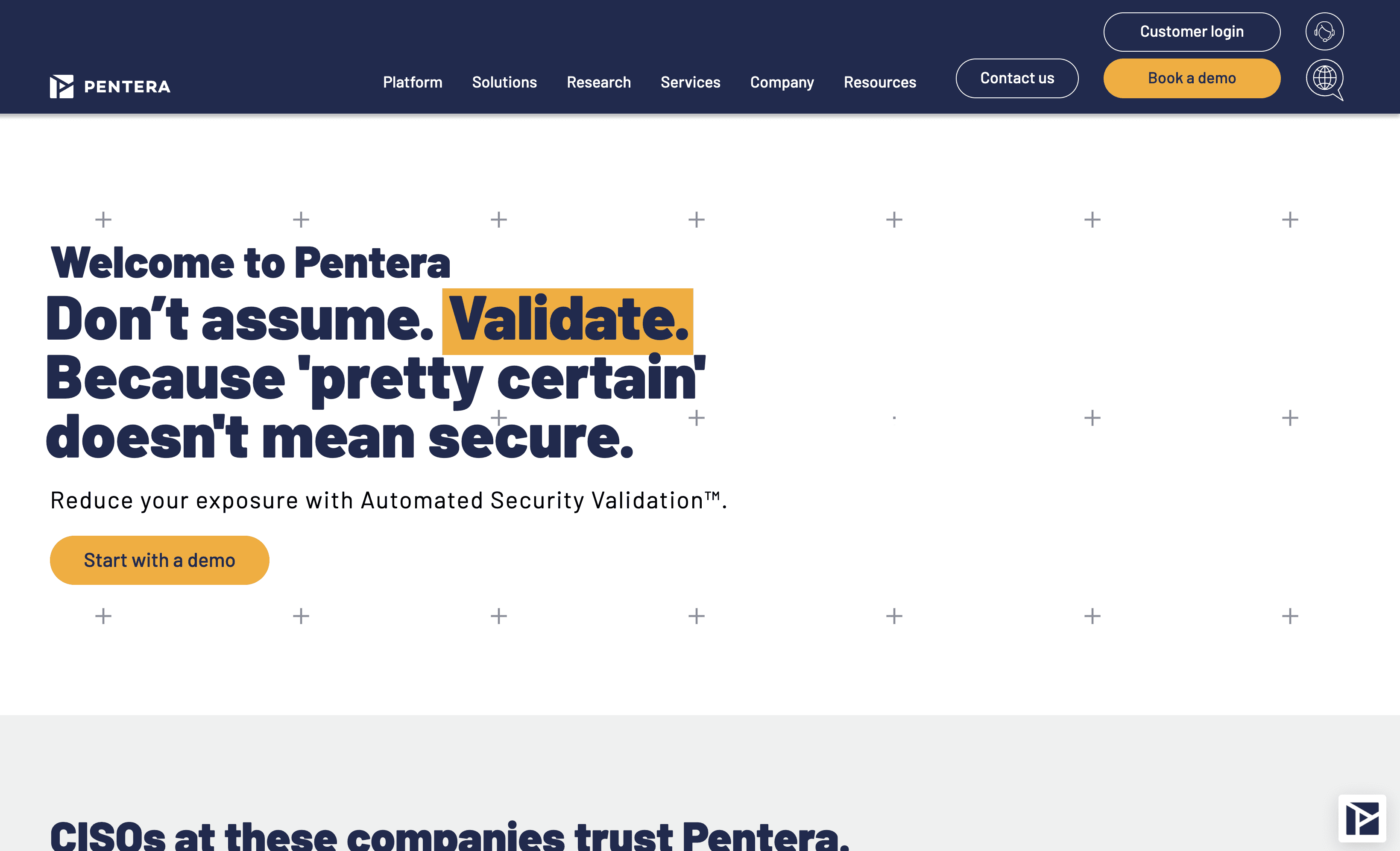
Pentera is an automated security validation platform designed to continuously test and validate your defenses against the latest cyber threats. It aims to identify and prioritize security gaps, providing actionable insights to enhance your security posture. With a focus on automation, Pentera simplifies the process of maintaining robust cybersecurity.
Pentera Pricing
Pentera's pricing is not public. Contact their support for more info.
Pentera Reviews
Pentera has an overall rating of 4.5 out of 5 stars based on 130 reviews. Users appreciate its ease of use and robust security features. Check out more of our reviews here!
Pros and Cons of Pentera
Pros:
Automated Security Validation reduces exposure by continuously testing against the latest cyber threats, ensuring robust protection.
High ROI, with midsized and larger organizations seeing returns between 525% to 600%, making it a cost-effective solution.
Trusted by CISOs and recognized as a leader on G2, with a 96% recommendation rate and a 4.7/5 rating.
Cons:
Expensive pricing can be a barrier for smaller organizations, limiting accessibility despite its high ROI.
Some users report limited features and scope, which may not meet all security needs.
Technical issues, though generally resolved quickly, can disrupt operations and require attention.
7. Forcepoint ONE
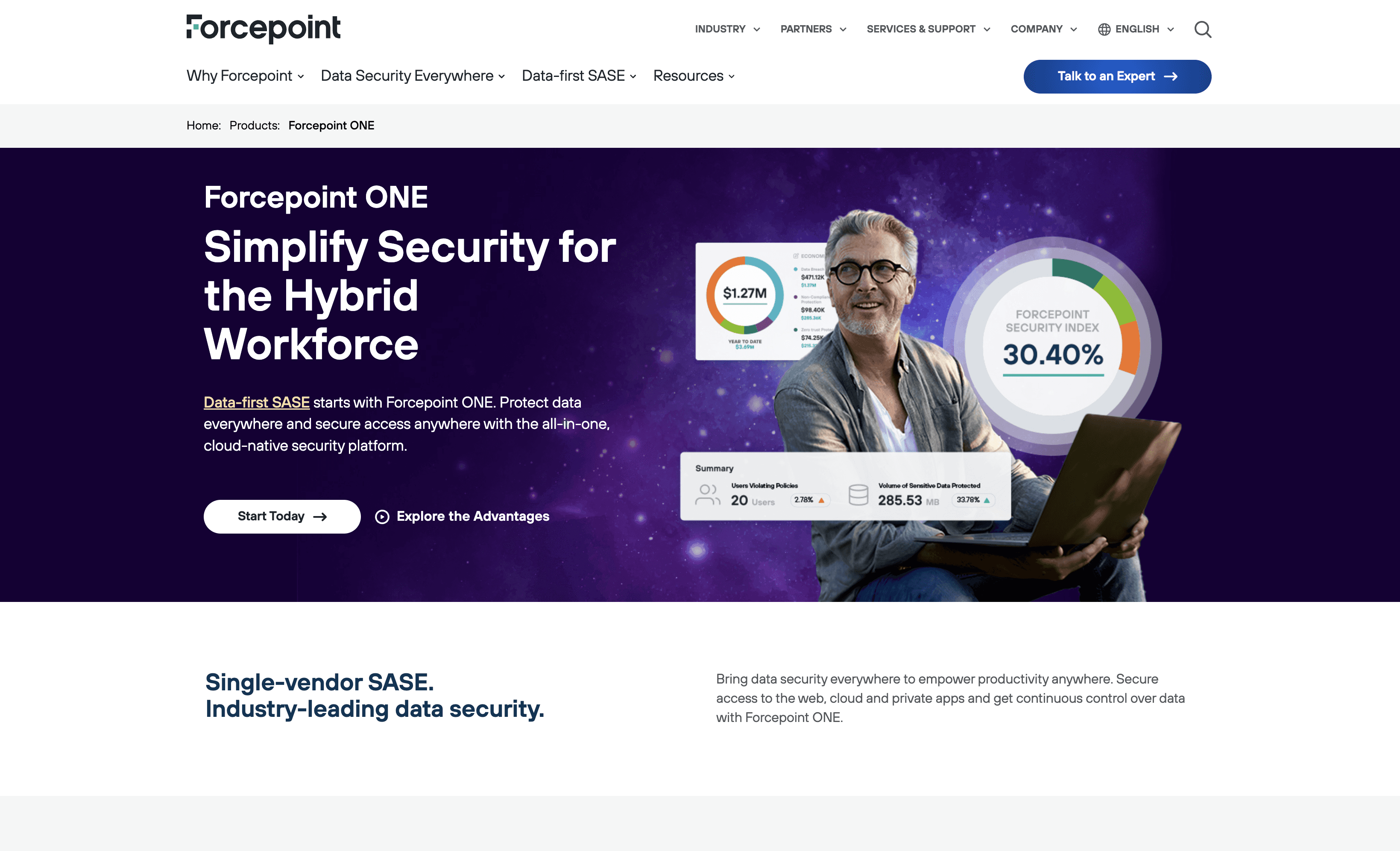
Forcepoint ONE is a cloud-native security platform designed to simplify security for hybrid workforces. It offers data-first SASE, protecting data everywhere and securing access anywhere. With features like CASB, ZTNA, and Web Security, Forcepoint ONE aims to modernize security infrastructure and adopt Zero Trust principles.
Forcepoint ONE Pricing
Forcepoint ONE's pricing is not public. Contact their support for more info.
Forcepoint ONE Reviews
Forcepoint ONE has an overall rating of 4.2 out of 5 stars based on 21 reviews. Users appreciate its ease of use and robust security features. Check out more of our reviews here!
Pros and Cons of Forcepoint ONE
Pros:
Cloud Management: Users appreciate the ease of managing policies and users in the cloud, simplifying administrative tasks.
Customer Support: Good support from customer service ensures issues are resolved promptly, enhancing user experience.
Ease of Use: The product is noted for being flexible and easy to use, making it accessible for various user levels.
Cons:
Integration Issues: Challenges with integrating Forcepoint ONE with other solutions can complicate deployment.
Sync Time: Sometimes the sync time can be longer than expected, affecting real-time data updates.
Deployment Complexity: The deployment phase can be difficult and complex, requiring significant effort and expertise.
8. Trend Micro
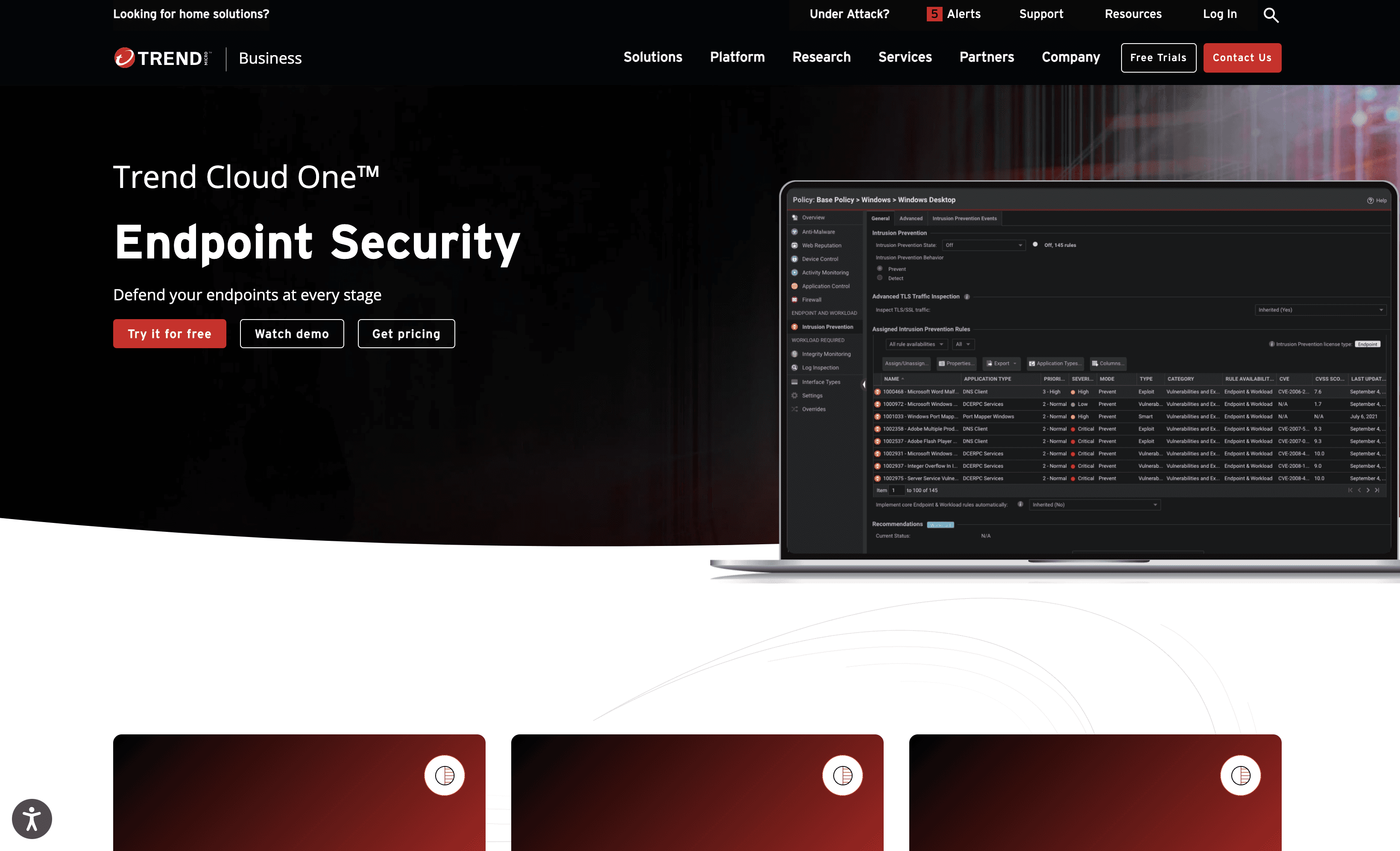
Trend Micro is a cybersecurity solution offering comprehensive endpoint protection. It integrates seamlessly with other security products, providing layered security for prevention, detection, and response. Designed for ease of use and high performance, Trend Micro aims to secure businesses of all sizes against evolving cyber threats.
Trend Micro Pricing
Trend Micro's pricing is not public. Contact their support for more info.
Trend Micro Reviews
Trend Micro has an overall rating of 4.2 out of 5 stars based on 34 reviews. Users appreciate its ease of implementation and customer support. Check out more of our reviews here!
Pros and Cons of Trend Micro
Pros:
Comprehensive Security: Offers a full range of advanced endpoint security capabilities in a single SaaS solution.
Unified Management: Provides unified visibility and management across services, simplifying administrative tasks.
Broad Threat Protection: Smart, layered security maximizes prevention, detection, and response for diverse endpoints.
Cons:
Slow Performance: Some users report that the software can slow down system performance, affecting productivity.
Complex Deployment: Initial setup and deployment can be complex, requiring significant time and expertise.
Cost: High-end features and comprehensive security solutions can be expensive, limiting accessibility for smaller businesses.
9. Snyk
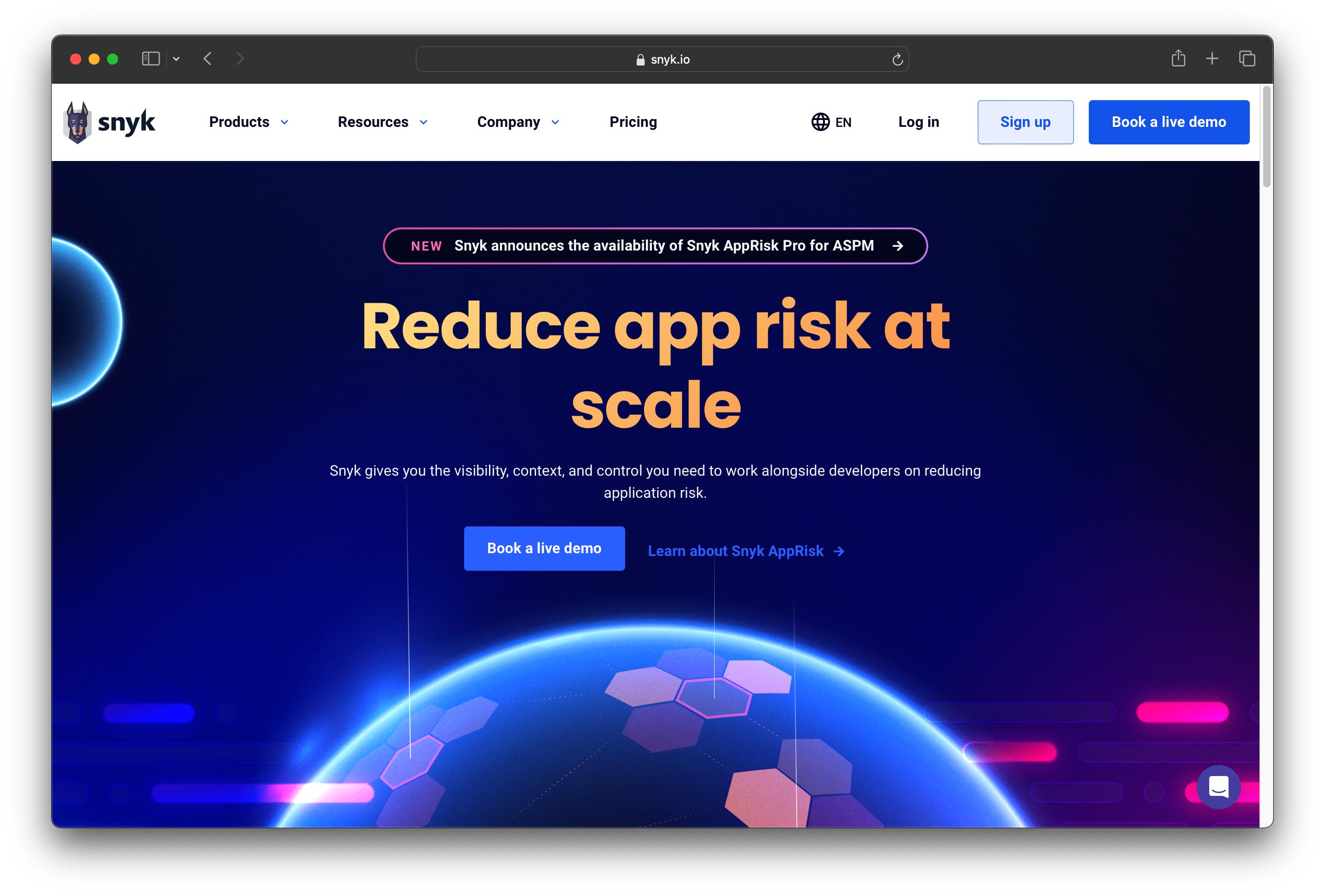
Snyk is a developer-first security platform that integrates seamlessly into development workflows. It offers tools for identifying and fixing vulnerabilities in code, open source libraries, containers, and infrastructure as code. Designed for ease of use, Snyk aims to help developers reduce application risk efficiently.
Snyk Pricing
Free Plan: $0 per developer/month
Team Plan: Starting at $25 per month/product
Enterprise Plan: Contact sales for pricing
Snyk Reviews
Snyk has an overall rating of 4.5 out of 5 stars based on 121 reviews. Users appreciate its seamless integration with major code repositories. Check out more of our reviews here!
Pros and Cons of Snyk
Pros:
Seamless Integration: Snyk integrates effortlessly with existing IDEs, repositories, and workflows, enhancing developer productivity.
Continuous Monitoring: It continuously scans for vulnerabilities during development, ensuring up-to-date security.
Actionable Fixes: Provides actionable fix advice and auto PRs for quick merging, streamlining the remediation process.
Cons:
False Positives: Some users report false positives, which can lead to unnecessary troubleshooting and wasted time.
Inefficient Scanning: Scanning can be slow at times, affecting the development workflow and productivity.
Inadequate Reporting: The reporting features are sometimes lacking in detail, making it harder to prioritize fixes.
10. Qualys
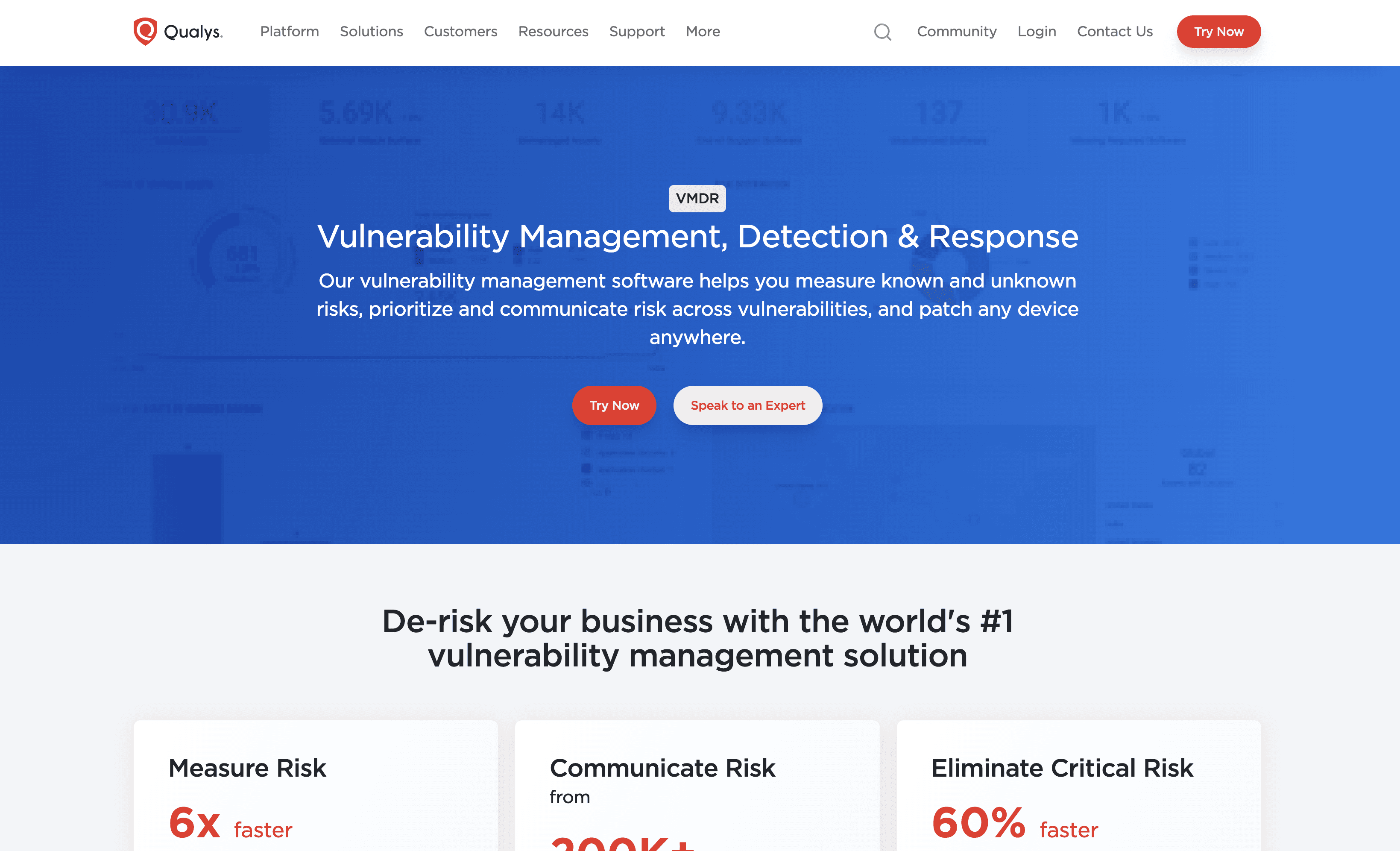
Qualys is a cybersecurity platform offering Vulnerability Management, Detection, and Response (VMDR). It aims to measure, manage, and reduce cyber risk efficiently. With features like real-time detection, automated remediation, and comprehensive asset visibility, Qualys provides a robust solution for businesses seeking to enhance their security posture.
Qualys Pricing
Qualys's pricing is not public. Contact their support for more info.
Qualys Reviews
Qualys has an overall rating of 4.1 out of 5 stars based on 21 reviews. Users appreciate its comprehensive asset management and detailed analysis. Check out more of our reviews here!
Pros and Cons of Qualys
Pros:
Comprehensive Asset Management: Provides significant visibility into the IT environment, foundational for security management.
Detailed Analysis: Offers in-depth analysis on each vulnerability and abundant details on network devices.
Customizable Scans: Allows customization of profiles and scans to meet specific requirements.
Cons:
Licensing Costs: Licensing the entire product suite can become expensive, especially for smaller organizations.
Web Portal Usability: The web portal is clumsy and not intuitive, with no significant improvements in recent years.
Slow Scanning Process: The scanning process is slow, and some results are false positives.
Looking to secure your technical infrastructure?
Twingate offers granular access controls and deployment automations to protect your VPC environment. By leveraging Zero Trust security tools, Twingate ensures that private resources and internet traffic remain secure in the modern work landscape. Try Twingate for Free today!
Rapidly implement a modern Zero Trust network that is more secure and maintainable than VPNs.
The Best 10 Alternatives to Lacework (+ Pricing & Reviews)
Twingate Team
•
Jul 27, 2024

Lacework provides a unified security platform for cloud environments, offering services such as cloud security, code security, edge security, and Kubernetes security. While Lacework offers robust solutions, it might not be the choice for everyone. This article explores the benefits and considerations of using Lacework for your security needs.

10 Alternatives to Lacework
1. Splunk

Splunk is a unified security and observability platform designed to enhance organizational resilience. Leveraging AI, it aims to fend off threats, reduce downtime, and expedite issue resolution. Splunk's solutions are tailored to accelerate detection, investigation, and response, making it a robust choice for businesses seeking comprehensive security and observability.
Splunk Pricing
Workload Pricing
Ingest Pricing
Entity Pricing
Activity-based Pricing
Splunk's pricing is not public. Contact their support for more info.
Splunk Reviews
Splunk has an overall rating of 4.3 out of 5 stars based on 36 reviews. Users praise its ease of use and robust security features. Check out more of our reviews here!
Pros and Cons of Splunk
Pros:
Splunk's AI-powered platform enhances security and observability, keeping humans in the loop for better decision-making.
Proven track record with leading organizations, improving threat response times and operational efficiency.
Unified platform provides comprehensive security and observability with shared data, context, and workflows.
Cons:
High cost associated with implementing and maintaining Splunk solutions, making it less accessible for smaller businesses.
Complexity requires specialized knowledge to fully leverage Splunk's capabilities, posing a learning curve.
Some users report limited features and missing functionalities, impacting overall user experience.
2. OPSWAT Security Score

OPSWAT Security Score is a cybersecurity tool designed to evaluate and enhance your computer's security posture. It assesses risk factors, ensures software is up-to-date, and provides real-time antivirus scanning and firewall enforcement. With features like patch management and malware scanning, it aims to offer comprehensive protection with minimal user intervention.
OPSWAT Security Score Pricing
Managed Version
Free Version
OPSWAT Security Score's pricing is not public. Contact their support for more info.
OPSWAT Security Score Reviews
OPSWAT Security Score has an overall rating of 4.0 out of 5 stars based on 5 reviews. Users appreciate its comprehensive security assessment. Check out more of our reviews here!
Pros and Cons ofOPSWAT Security Score
Pros:
Comprehensive cyber-risk assessment based on multiple factors, ensuring robust protection.
Automatic patch management for third-party applications and OS updates, reducing vulnerabilities.
Advanced malware scanning technologies, including multi-engine AV and sandboxing, for thorough threat detection.
Cons:
Limited features unless the profile is claimed and upgraded by the vendor.
Lack of detailed security information from the seller, which may concern some users.
Insufficient number of reviews to provide comprehensive buying insights.
3. Prisma Cloud

Prisma Cloud is a cloud security platform by Palo Alto Networks, designed to secure applications from code to cloud. It offers features like AI-powered risk insights, infrastructure protection, and real-time attack blocking, aiming to provide comprehensive security for modern cloud environments.
Prisma Cloud Pricing
Prisma Cloud's pricing is not public. Contact their support for more info.
Prisma Cloud Reviews
Prisma Cloud has an overall rating of 3.8 out of 5 stars based on 28 reviews. Users appreciate its comprehensive security features and ease of use. Check out more of our reviews here!
Pros and Cons of Prisma Cloud
Pros:
Comprehensive Security: Prisma Cloud secures every stage of the application lifecycle, from code to runtime, ensuring robust protection.
AI-Powered Risk Insights: Utilizes AI to rapidly prioritize risks and provide actionable insights, enhancing threat response.
Wide Range of Features: Includes code security, infrastructure protection, threat detection, and more, offering a holistic security solution.
Cons:
Complexity: The wide range of features and capabilities might be overwhelming for new users, requiring time to master.
Cost: Comprehensive security solutions can be expensive, which might be a consideration for smaller organizations.
Learning Curve: There might be a learning curve associated with fully utilizing all the features and capabilities of the platform.
4. Proofpoint

Proofpoint is a cybersecurity solution focused on protecting organizations from cyber threats. It offers a human-centric approach, emphasizing the protection of people and data. With features like email security, data loss prevention, and insider threat management, Proofpoint aims to provide comprehensive and adaptive protection for businesses.
Proofpoint Pricing
Proofpoint's pricing is not public. Contact their support for more info.
Proofpoint Reviews
Proofpoint has an overall rating of 4.6 out of 5 stars based on 498 reviews. Users appreciate its high detection rates and robust email filtering. Check out more of our reviews here!
Pros and Cons of Proofpoint
Pros:
Human-Centric Approach: Focuses on protecting individuals, crucial as most cyberattacks target people rather than just technology.
Comprehensive Solutions: Offers a wide range of products, including threat defense, information protection, and security awareness.
Industry Recognition: Trusted by 87 of the Fortune 100 companies and recognized as a leader by analyst firms.
Cons:
Complexity: The extensive range of products can be overwhelming for smaller organizations or those new to cybersecurity.
Cost: High-end, comprehensive solutions can be expensive, limiting accessibility for small to medium-sized businesses.
Integration Challenges: Implementing a multi-layered security platform may require significant integration efforts with existing systems.
5. ESET PROTECT Complete

ESET PROTECT Complete is a comprehensive cybersecurity solution designed for businesses. It offers advanced endpoint protection, mobile threat defense, full disk encryption, and cloud app protection. With easy deployment and integration capabilities, it aims to provide robust security while ensuring seamless operation within existing infrastructure.
ESET PROTECT Complete Pricing
Original Price: $338.50
Discounted Price: $287.72 (15% off)
ESET PROTECT Complete Reviews
ESET PROTECT Complete has an overall rating of 4.5 out of 5 stars based on 50 reviews. Users appreciate its comprehensive security features and ease of use. Check out more of our reviews here!
Pros and Cons of ESET PROTECT Complete
Pros:
Advanced Protection: Offers robust security for Microsoft 365 and Google Workspace apps, including anti-malware and anti-phishing features.
One-Click Data Encryption: Simplifies data protection with easy-to-use, one-click encryption for sensitive business information.
Multilayered Technology: Provides comprehensive security across endpoints, mobile devices, and file servers, ensuring thorough protection.
Cons:
Price Validity: Promotional pricing is only valid for the first term, with potential price changes afterward.
Additional Modules: Some advanced features require upgrades to higher tiers, which may incur extra costs.
Complexity for Small Businesses: The extensive features might be overwhelming for smaller organizations with simpler security needs.
6. Pentera

Pentera is an automated security validation platform designed to continuously test and validate your defenses against the latest cyber threats. It aims to identify and prioritize security gaps, providing actionable insights to enhance your security posture. With a focus on automation, Pentera simplifies the process of maintaining robust cybersecurity.
Pentera Pricing
Pentera's pricing is not public. Contact their support for more info.
Pentera Reviews
Pentera has an overall rating of 4.5 out of 5 stars based on 130 reviews. Users appreciate its ease of use and robust security features. Check out more of our reviews here!
Pros and Cons of Pentera
Pros:
Automated Security Validation reduces exposure by continuously testing against the latest cyber threats, ensuring robust protection.
High ROI, with midsized and larger organizations seeing returns between 525% to 600%, making it a cost-effective solution.
Trusted by CISOs and recognized as a leader on G2, with a 96% recommendation rate and a 4.7/5 rating.
Cons:
Expensive pricing can be a barrier for smaller organizations, limiting accessibility despite its high ROI.
Some users report limited features and scope, which may not meet all security needs.
Technical issues, though generally resolved quickly, can disrupt operations and require attention.
7. Forcepoint ONE

Forcepoint ONE is a cloud-native security platform designed to simplify security for hybrid workforces. It offers data-first SASE, protecting data everywhere and securing access anywhere. With features like CASB, ZTNA, and Web Security, Forcepoint ONE aims to modernize security infrastructure and adopt Zero Trust principles.
Forcepoint ONE Pricing
Forcepoint ONE's pricing is not public. Contact their support for more info.
Forcepoint ONE Reviews
Forcepoint ONE has an overall rating of 4.2 out of 5 stars based on 21 reviews. Users appreciate its ease of use and robust security features. Check out more of our reviews here!
Pros and Cons of Forcepoint ONE
Pros:
Cloud Management: Users appreciate the ease of managing policies and users in the cloud, simplifying administrative tasks.
Customer Support: Good support from customer service ensures issues are resolved promptly, enhancing user experience.
Ease of Use: The product is noted for being flexible and easy to use, making it accessible for various user levels.
Cons:
Integration Issues: Challenges with integrating Forcepoint ONE with other solutions can complicate deployment.
Sync Time: Sometimes the sync time can be longer than expected, affecting real-time data updates.
Deployment Complexity: The deployment phase can be difficult and complex, requiring significant effort and expertise.
8. Trend Micro

Trend Micro is a cybersecurity solution offering comprehensive endpoint protection. It integrates seamlessly with other security products, providing layered security for prevention, detection, and response. Designed for ease of use and high performance, Trend Micro aims to secure businesses of all sizes against evolving cyber threats.
Trend Micro Pricing
Trend Micro's pricing is not public. Contact their support for more info.
Trend Micro Reviews
Trend Micro has an overall rating of 4.2 out of 5 stars based on 34 reviews. Users appreciate its ease of implementation and customer support. Check out more of our reviews here!
Pros and Cons of Trend Micro
Pros:
Comprehensive Security: Offers a full range of advanced endpoint security capabilities in a single SaaS solution.
Unified Management: Provides unified visibility and management across services, simplifying administrative tasks.
Broad Threat Protection: Smart, layered security maximizes prevention, detection, and response for diverse endpoints.
Cons:
Slow Performance: Some users report that the software can slow down system performance, affecting productivity.
Complex Deployment: Initial setup and deployment can be complex, requiring significant time and expertise.
Cost: High-end features and comprehensive security solutions can be expensive, limiting accessibility for smaller businesses.
9. Snyk

Snyk is a developer-first security platform that integrates seamlessly into development workflows. It offers tools for identifying and fixing vulnerabilities in code, open source libraries, containers, and infrastructure as code. Designed for ease of use, Snyk aims to help developers reduce application risk efficiently.
Snyk Pricing
Free Plan: $0 per developer/month
Team Plan: Starting at $25 per month/product
Enterprise Plan: Contact sales for pricing
Snyk Reviews
Snyk has an overall rating of 4.5 out of 5 stars based on 121 reviews. Users appreciate its seamless integration with major code repositories. Check out more of our reviews here!
Pros and Cons of Snyk
Pros:
Seamless Integration: Snyk integrates effortlessly with existing IDEs, repositories, and workflows, enhancing developer productivity.
Continuous Monitoring: It continuously scans for vulnerabilities during development, ensuring up-to-date security.
Actionable Fixes: Provides actionable fix advice and auto PRs for quick merging, streamlining the remediation process.
Cons:
False Positives: Some users report false positives, which can lead to unnecessary troubleshooting and wasted time.
Inefficient Scanning: Scanning can be slow at times, affecting the development workflow and productivity.
Inadequate Reporting: The reporting features are sometimes lacking in detail, making it harder to prioritize fixes.
10. Qualys

Qualys is a cybersecurity platform offering Vulnerability Management, Detection, and Response (VMDR). It aims to measure, manage, and reduce cyber risk efficiently. With features like real-time detection, automated remediation, and comprehensive asset visibility, Qualys provides a robust solution for businesses seeking to enhance their security posture.
Qualys Pricing
Qualys's pricing is not public. Contact their support for more info.
Qualys Reviews
Qualys has an overall rating of 4.1 out of 5 stars based on 21 reviews. Users appreciate its comprehensive asset management and detailed analysis. Check out more of our reviews here!
Pros and Cons of Qualys
Pros:
Comprehensive Asset Management: Provides significant visibility into the IT environment, foundational for security management.
Detailed Analysis: Offers in-depth analysis on each vulnerability and abundant details on network devices.
Customizable Scans: Allows customization of profiles and scans to meet specific requirements.
Cons:
Licensing Costs: Licensing the entire product suite can become expensive, especially for smaller organizations.
Web Portal Usability: The web portal is clumsy and not intuitive, with no significant improvements in recent years.
Slow Scanning Process: The scanning process is slow, and some results are false positives.
Looking to secure your technical infrastructure?
Twingate offers granular access controls and deployment automations to protect your VPC environment. By leveraging Zero Trust security tools, Twingate ensures that private resources and internet traffic remain secure in the modern work landscape. Try Twingate for Free today!
Rapidly implement a modern Zero Trust network that is more secure and maintainable than VPNs.
The Best 10 Alternatives to Lacework (+ Pricing & Reviews)
Twingate Team
•
Jul 27, 2024

Lacework provides a unified security platform for cloud environments, offering services such as cloud security, code security, edge security, and Kubernetes security. While Lacework offers robust solutions, it might not be the choice for everyone. This article explores the benefits and considerations of using Lacework for your security needs.

10 Alternatives to Lacework
1. Splunk

Splunk is a unified security and observability platform designed to enhance organizational resilience. Leveraging AI, it aims to fend off threats, reduce downtime, and expedite issue resolution. Splunk's solutions are tailored to accelerate detection, investigation, and response, making it a robust choice for businesses seeking comprehensive security and observability.
Splunk Pricing
Workload Pricing
Ingest Pricing
Entity Pricing
Activity-based Pricing
Splunk's pricing is not public. Contact their support for more info.
Splunk Reviews
Splunk has an overall rating of 4.3 out of 5 stars based on 36 reviews. Users praise its ease of use and robust security features. Check out more of our reviews here!
Pros and Cons of Splunk
Pros:
Splunk's AI-powered platform enhances security and observability, keeping humans in the loop for better decision-making.
Proven track record with leading organizations, improving threat response times and operational efficiency.
Unified platform provides comprehensive security and observability with shared data, context, and workflows.
Cons:
High cost associated with implementing and maintaining Splunk solutions, making it less accessible for smaller businesses.
Complexity requires specialized knowledge to fully leverage Splunk's capabilities, posing a learning curve.
Some users report limited features and missing functionalities, impacting overall user experience.
2. OPSWAT Security Score

OPSWAT Security Score is a cybersecurity tool designed to evaluate and enhance your computer's security posture. It assesses risk factors, ensures software is up-to-date, and provides real-time antivirus scanning and firewall enforcement. With features like patch management and malware scanning, it aims to offer comprehensive protection with minimal user intervention.
OPSWAT Security Score Pricing
Managed Version
Free Version
OPSWAT Security Score's pricing is not public. Contact their support for more info.
OPSWAT Security Score Reviews
OPSWAT Security Score has an overall rating of 4.0 out of 5 stars based on 5 reviews. Users appreciate its comprehensive security assessment. Check out more of our reviews here!
Pros and Cons ofOPSWAT Security Score
Pros:
Comprehensive cyber-risk assessment based on multiple factors, ensuring robust protection.
Automatic patch management for third-party applications and OS updates, reducing vulnerabilities.
Advanced malware scanning technologies, including multi-engine AV and sandboxing, for thorough threat detection.
Cons:
Limited features unless the profile is claimed and upgraded by the vendor.
Lack of detailed security information from the seller, which may concern some users.
Insufficient number of reviews to provide comprehensive buying insights.
3. Prisma Cloud

Prisma Cloud is a cloud security platform by Palo Alto Networks, designed to secure applications from code to cloud. It offers features like AI-powered risk insights, infrastructure protection, and real-time attack blocking, aiming to provide comprehensive security for modern cloud environments.
Prisma Cloud Pricing
Prisma Cloud's pricing is not public. Contact their support for more info.
Prisma Cloud Reviews
Prisma Cloud has an overall rating of 3.8 out of 5 stars based on 28 reviews. Users appreciate its comprehensive security features and ease of use. Check out more of our reviews here!
Pros and Cons of Prisma Cloud
Pros:
Comprehensive Security: Prisma Cloud secures every stage of the application lifecycle, from code to runtime, ensuring robust protection.
AI-Powered Risk Insights: Utilizes AI to rapidly prioritize risks and provide actionable insights, enhancing threat response.
Wide Range of Features: Includes code security, infrastructure protection, threat detection, and more, offering a holistic security solution.
Cons:
Complexity: The wide range of features and capabilities might be overwhelming for new users, requiring time to master.
Cost: Comprehensive security solutions can be expensive, which might be a consideration for smaller organizations.
Learning Curve: There might be a learning curve associated with fully utilizing all the features and capabilities of the platform.
4. Proofpoint

Proofpoint is a cybersecurity solution focused on protecting organizations from cyber threats. It offers a human-centric approach, emphasizing the protection of people and data. With features like email security, data loss prevention, and insider threat management, Proofpoint aims to provide comprehensive and adaptive protection for businesses.
Proofpoint Pricing
Proofpoint's pricing is not public. Contact their support for more info.
Proofpoint Reviews
Proofpoint has an overall rating of 4.6 out of 5 stars based on 498 reviews. Users appreciate its high detection rates and robust email filtering. Check out more of our reviews here!
Pros and Cons of Proofpoint
Pros:
Human-Centric Approach: Focuses on protecting individuals, crucial as most cyberattacks target people rather than just technology.
Comprehensive Solutions: Offers a wide range of products, including threat defense, information protection, and security awareness.
Industry Recognition: Trusted by 87 of the Fortune 100 companies and recognized as a leader by analyst firms.
Cons:
Complexity: The extensive range of products can be overwhelming for smaller organizations or those new to cybersecurity.
Cost: High-end, comprehensive solutions can be expensive, limiting accessibility for small to medium-sized businesses.
Integration Challenges: Implementing a multi-layered security platform may require significant integration efforts with existing systems.
5. ESET PROTECT Complete

ESET PROTECT Complete is a comprehensive cybersecurity solution designed for businesses. It offers advanced endpoint protection, mobile threat defense, full disk encryption, and cloud app protection. With easy deployment and integration capabilities, it aims to provide robust security while ensuring seamless operation within existing infrastructure.
ESET PROTECT Complete Pricing
Original Price: $338.50
Discounted Price: $287.72 (15% off)
ESET PROTECT Complete Reviews
ESET PROTECT Complete has an overall rating of 4.5 out of 5 stars based on 50 reviews. Users appreciate its comprehensive security features and ease of use. Check out more of our reviews here!
Pros and Cons of ESET PROTECT Complete
Pros:
Advanced Protection: Offers robust security for Microsoft 365 and Google Workspace apps, including anti-malware and anti-phishing features.
One-Click Data Encryption: Simplifies data protection with easy-to-use, one-click encryption for sensitive business information.
Multilayered Technology: Provides comprehensive security across endpoints, mobile devices, and file servers, ensuring thorough protection.
Cons:
Price Validity: Promotional pricing is only valid for the first term, with potential price changes afterward.
Additional Modules: Some advanced features require upgrades to higher tiers, which may incur extra costs.
Complexity for Small Businesses: The extensive features might be overwhelming for smaller organizations with simpler security needs.
6. Pentera

Pentera is an automated security validation platform designed to continuously test and validate your defenses against the latest cyber threats. It aims to identify and prioritize security gaps, providing actionable insights to enhance your security posture. With a focus on automation, Pentera simplifies the process of maintaining robust cybersecurity.
Pentera Pricing
Pentera's pricing is not public. Contact their support for more info.
Pentera Reviews
Pentera has an overall rating of 4.5 out of 5 stars based on 130 reviews. Users appreciate its ease of use and robust security features. Check out more of our reviews here!
Pros and Cons of Pentera
Pros:
Automated Security Validation reduces exposure by continuously testing against the latest cyber threats, ensuring robust protection.
High ROI, with midsized and larger organizations seeing returns between 525% to 600%, making it a cost-effective solution.
Trusted by CISOs and recognized as a leader on G2, with a 96% recommendation rate and a 4.7/5 rating.
Cons:
Expensive pricing can be a barrier for smaller organizations, limiting accessibility despite its high ROI.
Some users report limited features and scope, which may not meet all security needs.
Technical issues, though generally resolved quickly, can disrupt operations and require attention.
7. Forcepoint ONE

Forcepoint ONE is a cloud-native security platform designed to simplify security for hybrid workforces. It offers data-first SASE, protecting data everywhere and securing access anywhere. With features like CASB, ZTNA, and Web Security, Forcepoint ONE aims to modernize security infrastructure and adopt Zero Trust principles.
Forcepoint ONE Pricing
Forcepoint ONE's pricing is not public. Contact their support for more info.
Forcepoint ONE Reviews
Forcepoint ONE has an overall rating of 4.2 out of 5 stars based on 21 reviews. Users appreciate its ease of use and robust security features. Check out more of our reviews here!
Pros and Cons of Forcepoint ONE
Pros:
Cloud Management: Users appreciate the ease of managing policies and users in the cloud, simplifying administrative tasks.
Customer Support: Good support from customer service ensures issues are resolved promptly, enhancing user experience.
Ease of Use: The product is noted for being flexible and easy to use, making it accessible for various user levels.
Cons:
Integration Issues: Challenges with integrating Forcepoint ONE with other solutions can complicate deployment.
Sync Time: Sometimes the sync time can be longer than expected, affecting real-time data updates.
Deployment Complexity: The deployment phase can be difficult and complex, requiring significant effort and expertise.
8. Trend Micro

Trend Micro is a cybersecurity solution offering comprehensive endpoint protection. It integrates seamlessly with other security products, providing layered security for prevention, detection, and response. Designed for ease of use and high performance, Trend Micro aims to secure businesses of all sizes against evolving cyber threats.
Trend Micro Pricing
Trend Micro's pricing is not public. Contact their support for more info.
Trend Micro Reviews
Trend Micro has an overall rating of 4.2 out of 5 stars based on 34 reviews. Users appreciate its ease of implementation and customer support. Check out more of our reviews here!
Pros and Cons of Trend Micro
Pros:
Comprehensive Security: Offers a full range of advanced endpoint security capabilities in a single SaaS solution.
Unified Management: Provides unified visibility and management across services, simplifying administrative tasks.
Broad Threat Protection: Smart, layered security maximizes prevention, detection, and response for diverse endpoints.
Cons:
Slow Performance: Some users report that the software can slow down system performance, affecting productivity.
Complex Deployment: Initial setup and deployment can be complex, requiring significant time and expertise.
Cost: High-end features and comprehensive security solutions can be expensive, limiting accessibility for smaller businesses.
9. Snyk

Snyk is a developer-first security platform that integrates seamlessly into development workflows. It offers tools for identifying and fixing vulnerabilities in code, open source libraries, containers, and infrastructure as code. Designed for ease of use, Snyk aims to help developers reduce application risk efficiently.
Snyk Pricing
Free Plan: $0 per developer/month
Team Plan: Starting at $25 per month/product
Enterprise Plan: Contact sales for pricing
Snyk Reviews
Snyk has an overall rating of 4.5 out of 5 stars based on 121 reviews. Users appreciate its seamless integration with major code repositories. Check out more of our reviews here!
Pros and Cons of Snyk
Pros:
Seamless Integration: Snyk integrates effortlessly with existing IDEs, repositories, and workflows, enhancing developer productivity.
Continuous Monitoring: It continuously scans for vulnerabilities during development, ensuring up-to-date security.
Actionable Fixes: Provides actionable fix advice and auto PRs for quick merging, streamlining the remediation process.
Cons:
False Positives: Some users report false positives, which can lead to unnecessary troubleshooting and wasted time.
Inefficient Scanning: Scanning can be slow at times, affecting the development workflow and productivity.
Inadequate Reporting: The reporting features are sometimes lacking in detail, making it harder to prioritize fixes.
10. Qualys

Qualys is a cybersecurity platform offering Vulnerability Management, Detection, and Response (VMDR). It aims to measure, manage, and reduce cyber risk efficiently. With features like real-time detection, automated remediation, and comprehensive asset visibility, Qualys provides a robust solution for businesses seeking to enhance their security posture.
Qualys Pricing
Qualys's pricing is not public. Contact their support for more info.
Qualys Reviews
Qualys has an overall rating of 4.1 out of 5 stars based on 21 reviews. Users appreciate its comprehensive asset management and detailed analysis. Check out more of our reviews here!
Pros and Cons of Qualys
Pros:
Comprehensive Asset Management: Provides significant visibility into the IT environment, foundational for security management.
Detailed Analysis: Offers in-depth analysis on each vulnerability and abundant details on network devices.
Customizable Scans: Allows customization of profiles and scans to meet specific requirements.
Cons:
Licensing Costs: Licensing the entire product suite can become expensive, especially for smaller organizations.
Web Portal Usability: The web portal is clumsy and not intuitive, with no significant improvements in recent years.
Slow Scanning Process: The scanning process is slow, and some results are false positives.
Looking to secure your technical infrastructure?
Twingate offers granular access controls and deployment automations to protect your VPC environment. By leveraging Zero Trust security tools, Twingate ensures that private resources and internet traffic remain secure in the modern work landscape. Try Twingate for Free today!
Solutions
Solutions
The VPN replacement your workforce will love.
Solutions